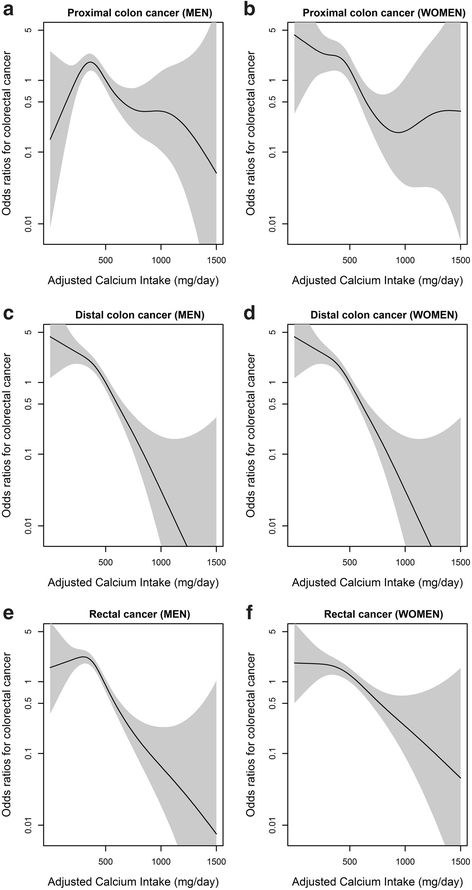Dietary calcium intake and the risk of colorectal cancer: a case control study
- PMID: 26675033
- PMCID: PMC4682267
- DOI: 10.1186/s12885-015-1963-9
Dietary calcium intake and the risk of colorectal cancer: a case control study
Abstract
Background: High intake of dietary calcium has been thought to be a protective factor against colorectal cancer. To explore the dose-response relationship in the associations between dietary calcium intake and colorectal cancer risk by cancer location, we conducted a case-control study among Korean population, whose dietary calcium intake levels are relatively low.
Methods: The colorectal cancer cases and controls were recruited from the National Cancer Center in Korea between August 2010 and August 2013. Information on dietary calcium intake was assessed using a semi-quantitative food frequency questionnaire and locations of the colorectal cancers were classified as proximal colon cancer, distal colon cancer, and rectal cancer. Binary and polytomous logistic regression models were used to evaluate the association between dietary calcium intake and risk of colorectal cancer.
Results: A total of 922 colorectal cancer cases and 2766 controls were included in the final analysis. Compared with the lowest calcium intake quartile, the highest quartile group showed a significantly reduced risk of colorectal cancer in both men and women. (Odds ratio (OR): 0.16, 95% confidence interval (CI): 0.11-0.24 for men; OR: 0.16, 95% CI: 0.09-0.29 for women). Among the highest calcium intake groups, decrease in cancer risk was observed across all sub-sites of colorectum in both men and women.
Conclusion: In conclusion, calcium consumption was inversely related to colorectal cancer risk in Korean population where national average calcium intake level is relatively lower than Western countries. A decreased risk of colorectal cancer by calcium intake was observed in all sub-sites in men and women.
Figures


References
-
- Ferlay J, Soerjomataram I, Ervik M, Dikshit R, Eser S, Mathers C, et al. GLOBOCAN 2012 v1. 0, cancer incidence and mortality worldwide: IARC CancerBase No. 11 [internet] Lyon: International Agency for Research on Cancer; 2014.
Publication types
MeSH terms
Substances
LinkOut - more resources
Full Text Sources
Other Literature Sources
Medical

